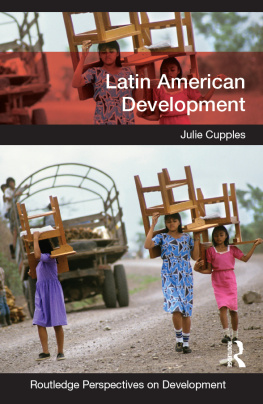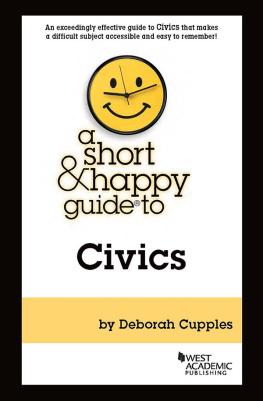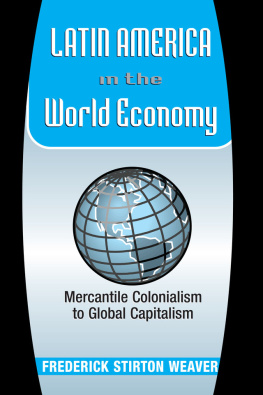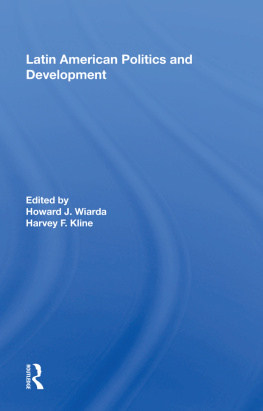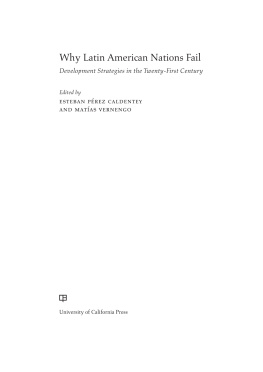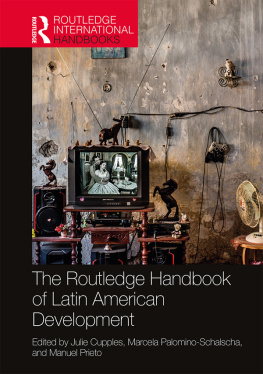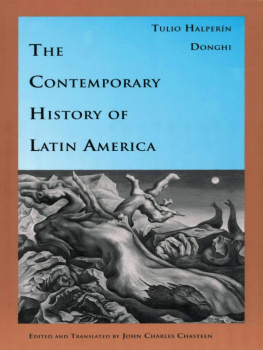This book is a delight and its approach long overdue. By broadening its interpretation of the meaning of development and by addressing many of the most contested issues in academic and political debates in and on Latin America, it brings home to the reader, but in an eminently comprehensible and digestible form, the complexity of the regions recent and contemporary patterns of economic, social and political transformation. Moreover, to its great credit, it does so with a sharp eye, a sympathetic ear and a clarity and comprehensiveness which have all been sadly lacking in such books for several decades. This book sets the picture straight and does us all an invaluable service.
Antoni Kapcia, Professor in Latin American History,
Faculty of Arts, University of Nottingham, UK
This book is a critical introduction to Latin America and its experience with development, and provides an invaluable resource to both students and scholars. Historically and geographically rich, this book examines processes of state formation and political economic thought through the colonial period and the Republican era, the emergence of Industrial Import Substitution and the dependency school, and the rise of neoliberalism and its discontents. These historical transformations have of course been marked by ideological struggle and political violence, and Julie Cupples proves the ideal guide to the continents shifting political and economic landscapes. The book highlights difference as well as continuity, and its attention to the regions immense ethnic, linguistic, cultural, class, and ecological diversity is particularly valuable. Latin American Development provides a nuanced and authoritative look at political and economic change in the American continent.
Tom Perreault, Associate Professor of Geography,
Department of Geography, Syracuse University, USA
Latin American Development
Latin Americas diverse political and economic struggles and triumphs have captured the global imagination. The region has been a site of brutal dictators, revolutionary heroes, the Cold War struggle and a place in which the global debt crisis has had some of its most lasting and devastating impacts. Latin America continues to undergo rapid transformation, demonstrating both inspirational change and frustrating continuities.
This text provides a comprehensive introduction to Latin American development in the twenty-first century, emphasizing political, economic, social, cultural and environmental dimensions of development. It considers key challenges facing the region and the diverse ways in which its people are responding, as well as providing analysis of the ways in which such challenges and responses can be theorized. The book also explores the regions historical trajectory, the implementation and rejection of the neoliberal model and the role played by diverse social movements. Relations of gender, class and race are considered, as well as the ways in which media and popular culture are forging new global imaginaries of the continent. The text also considers the increasing difficulties that Latin America faces in confronting climate change and environmental degradation.
This accessible text gives an overarching historical and geographical analysis of the region and critical analysis of recent developments. It is accompanied by a diverse range of critical historical and contemporary case studies from all parts of the continent, providing readers with the conceptual tools required to analyse theories on Latin American development. Each chapter ends with a summary section, discussion topics, suggestions for further reading, websites and media resources. This is an indispensable resource for scholars, students and practitioners.
Julie Cupples currently lectures in Human Geography at the University of Edinburgh. She has been working in and on Latin American development for more than two decades, through both Central American solidarity and academic scholarship. Most of her research has been carried out in Nicaragua. She has published widely on a range of themes including postdevelopment, gender, revolution and conflict, neoliberalism, elections, municipal governance, indigenous and community media, and climate change, disasters and environmental risk.
ROUTLEDGE PERSPECTIVES ON DEVELOPMENT
Series Editor: Professor Tony Binns, University of Otago
Since it was established in 2000, the same year as the Millennium Development Goals were set by the United Nations, the Routledge Perspectives on Development series has become the pre-eminent international textbook series on key development issues. Written by leading authors in their fields, the books have been popular with academics and students working in disciplines such as anthropology, economics, geography, international relations, politics and sociology. The series has also proved to be of particular interest to those working in interdisciplinary fields, such as area studies (African, Asian and Latin American studies), development studies, environmental studies, peace and conflict studies, rural and urban studies, travel and tourism.
If you would like to submit a book proposal for the series, please contact the Series Editor, Tony Binns, on: jab@geography.otago.ac.nz
Published:
Third World Cities, 2nd edition
David W. Drakakis-Smith
RuralUrban Interactions in the Developing World
Kenneth Lynch
Environmental Management and Development
Chris Barrow
Tourism and Development
Richard Sharpley and David J. Telfer
Southeast Asian Development
Andrew McGregor
Population and Development
W.T.S. Gould
Postcolonialism and Development
Cheryl McEwan
Conflict and Development
Andrew Williams and Roger MacGinty
Disaster and Development
Andrew Collins
Non-Governmental Organisations and Development
David Lewis and Nazneen Kanji
Cities and Development
Jo Beall
Gender and Development, 2nd Edition
Janet Momsen
Economics and Development Studies
Michael Tribe, Frederick Nixson and Andrew Sumner
Water Resources and Development
Clive Agnew and Philip Woodhouse
Theories and Practices of Development, 2nd Edition
Katie Willis
Food and Development
E.M. Young
An Introduction to Sustainable Development,
4th Edition
Jennifer Elliott
Latin American Development
Julie Cupples
Religions and Development
Emma Tomalin
Forthcoming:
Global Finance and Development
David Hudson
Natural Resource Extraction and Development
Roy Maconachie and Gavin M. Hilson
Development Organizations
Rebecca Shaaf
Children, Youth and Development, 2nd Edition
Nicola Ansell
Climate Change and Development
Thomas Tanner and Leo Horn-Phathanothai
Politics and Development
Heather Marquette and Tom Hewitt
South Asian Development
Trevor Birkenholtz
Conservation and Development
Shonil Bhagwat and Andrew Newsham


